#Skill Building Upskilling
Text
Creating Magic at Work with Amy Lynn Durham
“What mask are you putting on?”
In this episode, Amy Lynn Durham enlightens us on emotional and spiritual Intelligence and skill building that could help us realise our life purpose.
“What mask are you putting on?”
In this episode, Amy Lynn Durham enlightens us on spiritual Intelligence and skill building that could help us realise our life purpose. She talks to us about the relationship between spiritual and emotional intelligence. She shares practices to energise and transform our lives and the workplace.
“Your life is extremely profound and also a tiny piece of the…
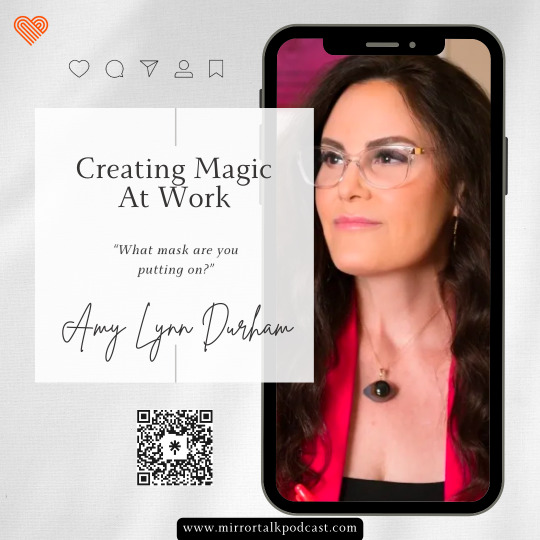
View On WordPress
#Amy Lynn Durham#Creating Magic at Work#Emotional Intelligence#Entrepreneur#Life Purpose#MIRROR TALK#Personal Development#podcast#purposeful life#Skill Building Upskilling#Spiritual Intelligence
1 note
·
View note
Text
Coding to Business Skills: Top Online Courses for Skill Development
From #coding to business skills, these are the top online courses for skill development.
#learning
Online learning has become increasingly popular in recent years. Whether you’re looking to learn new skills or brush up on old ones, there are plenty of options available. Here are some of our favorite online courses for skill development – from coding to business skills.
5 Online Courses for Skill Development
We are sharing 5 top resources for online learning – from coding to leadership…
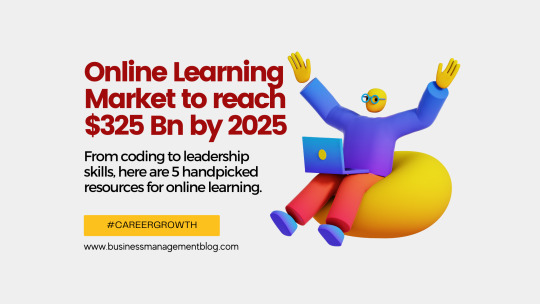
View On WordPress
0 notes
Note
Do you have tips on how to be emotionally mature?
Remember that everyone is ultimately out for themselves. They don't think about you and your choices as much as you think they do. Make taking care of yourself and advocating for yourself your #1 priority. While you should be respectful and show empathy for others' circumstances, your life is meant to be lived for you.
Don't take people's comments or actions personally. Almost none of their responses are a reflection of you or your character. Most people's actions are a reflection of how they see themselves. When people reveal their true colors, believe them. Proceed with this information in mind – whether it's a friendship, professional opportunity, romantic endeavor, familial tie, etc.
Set boundaries and non-negotiables for yourself. Don't overextend yourself to seek approval or validation as a means of dictating your self-worth or value to others. Learn to trust your gut instincts, and remain mindful of your energetic limitations. "No" is a complete sentence. It is not selfish to stick to your non-negotiable habits (bedtime, workout schedule, etc.) – these practices are a sign of self-respect and self-love. Speak your mind (with tact) and stand your ground. You owe it to yourself to live the life that you want.
Know that the only constant in life is change. People and opportunities will come and go with age. Enjoy the moments and experiences you get to enjoy with others or alone. Relationships are meant to last for a season, a reason, or a lifetime. Not every impactful connection is meant to last a lifetime, but you shouldn't invalidate the lasting impact of certain temporary connections – they most definitely can change your life.
Remain selective about those you allow into your life and the company you keep. Embrace the quality over quantity approach when it comes to choosing the individuals who deserve to be in your inner circle. Don't disclose information you wouldn't want in writing to those who have yet to earn your trust. Cut ties unapologetically with people who choose to tear you down or disrespect you. You win in life when everyone you're close to is supportive and committed to cheering each other on in all of their life goals/milestones.
Learn to accept and explore discomfort. Growth requires change, and a side effect of change is discomfort. Accept that the circumstances are presenting you with an opportunity in life to level up. Breathe and take things one step at a time. Sometimes, you don't need to know the big-picture meaning of the conversation or task in front of you. Focus on what's in front of you – using good judgment and critical thinking skills – and figure the rest out later.
Set your future self up to win. Eat a healthy diet, move your body, save and invest, read books, build your professional and social networks, and upskill professionally and interpersonally, go to the doctors annually (all the major ones – primary care, dentist, gyno, dermatologist) or whenever an issue presents itself to nip it in the bud early.
Remain curious. Don't act on baseless assumptions. Ask someone about the intention or emotions behind their actions before creating a conflict or making accusations. Accept wishful thinking for what it is – especially when it comes to romance and professional endeavors. A job offer doesn't exist until it's signed and sealed in writing. Relationships come with exclusivity, clear and regular communication, and no issues with public knowledge or a title.
Reframe mistakes and failures as life lessons. These opportunities inspire self-reflection, performance evaluation, and introspection. Use these experiences to help you map out your next moves and strategize your actions toward success.
Creating life milestone timelines is useless. We all have our own history, circumstances, goals, and personalities. Individuals born in each given year are not a hivemind. Don't compare your journey to others. We are all on our own paths with different significant milestones at different points in our lives.
Embrace your desires. Indulge your adult self and inner child. Explore the pleasure of getting to know yourself – your likes, dislikes, values, preferences, and turn-ons/turnoffs in every area of life. Allow yourself the time, space, energy, and resources you need to satisfy your authentic self. Don't compromise your identity for the approval or praise of others. Learn what you want and be unapologetic for satisfying your own needs. Discover, experiment, play, test, learn, and re-evaluate as needed. Gamifying your life helps free you of societal expectations of what it means to be a certain age, gender, or personality based on your nationality, profession, sexuality, socioeconomic status, etc.
#life lessons#life path#life advice#femme fatale#emotional maturity#dark feminine energy#dark femininity#boundaries#self love#self respect#shadow work#it girl#dream girl#queen energy#goal setting#healthylifestyle#healthyhabits#self healing#healingjourney#level up#glow up#self reflection#self awareness#self improvement#self help#self care#girl advice#high value woman#the feminine urge#female excellence
371 notes
·
View notes
Note
Ola Adora! ♡ Welcome back! You've been missed! You left me wandering aimlessly here 😭
I have a question, could you please explain which timeline you use for your energy readings, do you read the past, present or future energy of the seven & spouses?
Also can we please have a current energy check reading on all the BTS Future Spouses please? (:
♡ This reading has an extended version for Ko-fi monthly members [view here]
Update on the fs' energies 27/08/2023
Namjoon’s fs
6 of cups, 8 of cups, 10 of pentacles
Either visiting home for a short amount of time and reconnecting with their roots or in the process of leaving home because of a job. Getting out of their comfort and exploring new possibilities. A lot of deja vu and nostalgia coming through. Working hard to let go of the past and move on to new horizons. Working on becoming consistent with the things that they do and enjoying themselves.
Jin’s fs
The empress, queen of pentacles, knight of swords
Jin’s fs never disappoints, their energy is always 10/10. They are definitely feeling themselves right now, life just seems to be going well! They may be focused on exercising, doing yoga? cooking good food, being the amazing person they are. Manifesting is important for this person, they walk like they own the place because they know that they eventually will. Focused on money and building an empire of some sorts. Doing everything very quickly and having a lot of different ideas.
Suga’s fs
10 of pentacles, 5 of pentacles and temperance
The fs may have recently struggled with money, I feel like this month was a bit tight and hard. But there could be some unexpected money coming in or it already did…inheritance potentially? Or the fs’ family will be gifting them something worth money. Wanting to build an empire of their own. Focused on moving away from financial hardships and focusing on balancing their own energy - finding happiness in the little things and bringing a smile to the face of the people around them. Spending a lot more time with friends than usual even making new friends?!
Hoseok’s fs
9 of cups in reverse, the tower, the star
Suddenly, they don’t feel successful enough? They are re-evaluating their achievements and what makes them feel successful. What am I working so hard for? What keeps them going? A lot of things have happened at once in their life. Feeling a little bit unsettled, everything seemed to go wrong but they realised that this had to happen so that new things could come to their life. Very hopeful energy. Wanting and asking for guidance. They may be looking for signs - this is a sign!
Jimin’s fs
Knight of pentacles, page of pentacles, 6 of wands
Slowly but surely they are getting to a place where they want to be. This person is currently very focused and determined, DO NOT GET IN THEIR WAY! They may be learning a new skill? There is definitely a bit of studying coming through or upskilling within their industry. They may be in the spotlight at the moment due to their hard work, they are getting recognition for their efforts and they are enjoying it! They love getting recognised for something that they have put their heart and soul into. People may ask this person for guidance and to mentor them.
Taehyung’s fs
3 of swords, 2 of cups, the world
Ooooof I feel like V’s fs is very up and down in energy. Within the last year or so they may have had a huge heartbreak that they may still be getting over. There seem to be better days and worse days but they are slowly working on picking up all of the pieces. They are figuring out exactly what it is that they want out of a romantic partner. However, they are also very focused on putting themselves first right now because in the past they have put others before themselves and it ended in resentment feelings growing,
Jungkook’s fs
6 of cups, queen of pentacles, 6 of pentacles
Lots of 6s! This person may be getting signs again - and a lot of them! This person is currently helping their friends and even family. Giving a lot of time and even some money to those around them. There is a lot of joy coming from this person because they are in a position in which they can help! They may have been around flowers lately?! This is also someone who has been working from home - fulfilling a childhood dream.
All the love,
#bts tarot#kpop tarot#bts tarot readings#bts fs#jungkook tarot#jk tarot#yoongi tarot#bts ask#rm tarot#v tarot#hoseok fs#jhope fs#jhope tarot#taehyung fs#jimin fs#jimin tarot#namjoon tarot#namjoon fs#jeon jungkook#bts ot7 tarot
63 notes
·
View notes
Text
911 Mature Fic Master List
This is a master list of my Mature rated 911 fic. There are separate master lists of my fic with other ratings.
Currents
Rating / Ao3 Warnings: Mature / none
Genre: Crack, whump
Chapters / Length: 9 / 50k
Main Pairing: Buddie getting together
Set: season 3
Summary:
After the tsunami, Buck convinces the LAFD to upskill firefighters in swift water rescue skills and so the 118 go on a white-water rafting trip. Team building and pranks happen – and some other things too.
Choices & Consequences
Rating / Ao3 Warnings: Mature / none
Genre: Whump
Chapters / Length: 5 / 23.5k
Main Pairing: Buddie getting together
Set: season 5b
Summary:
Athena was wrong. The man she thought was the Speed bomber was innocent. And now Buck and Lucy were missing.
Trust me, Darlin’
911 / Supernatural crossover written with TheInverseUniverse
Rating / Ao3 Warnings: Mature / Creator Chose Not To Use Archive Warnings
Genre: Whump, angst
Chapters / Length: 11 / 77.8k
Main Pairing: Buddie
Set: post season 3
Summary:
“Trust me, darlin’,” Dean whispered in his ear, and Buck nodded, all too aware of the gun against his head.
They’d met twice before, their paths crossing as they worked their ways across the country. Two chance meetings, two very enjoyable encounters. Years later, a series of demonic church arsons bring them back together.
Being taken hostage was not how Buck expected to reunite with Dean.
The Benefits of Massage
Rating / Ao3 Warnings: Mature / none
Genre: Crack
Length: 3k
Main Pairing: Buddie getting together
Set: post season 5
Summary:
Buck navigates one of the trickier aspects of parenting, and does it pretty well, or so he thinks.
Until everything comes to light at a 118 barbeque.
There walks darkness
Rating / Ao3 Warnings: Mature / Creator Chose Not To Use Archive Warnings; Rape/Non-Con (presumed rape not actual, but there is non-con)
Genre: Whump, heavy angst
Chapters / Length: 7 / 27.7k
Main Pairing: Buddie
Set: season 5
Summary:
Maddie didn’t kill Doug in the woods when he attacked her. Instead, he was arrested and sent to prison for life. The same prison the 118 are called into to deal with the riot fires in started during a prison brawl…
Buck doesn’t get a good look at the second escapee in the ambulance until it’s far too late.
All the time in the world
Rating / Ao3 Warnings: Mature / none
Genre: Hurt/comfort
Length: 1.8k
Main Pairing: Buddie getting together
Set: season 6b
Summary:
A missing scene between when Buck fell asleep on Eddie's couch and the kitchen scene in which Eddie has a panicked flashback and Buck comforts him.
Losing Hope
Rating / Ao3 Warnings: Mature / none
Genre: Mpreg, miscarriage
Chapters / Length: 2 / 10k
Main Pairing: Buddie
Set: season 3
Summary:
Hope can be a powerful force, but what happens when it's lost?
Buck and Eddie's love story takes a tragic turn as their relationship ends abruptly after Eddie feels betrayed by the lawsuit. Alone, Buck faces the consequences of their actions when he learns he is unexpectedly pregnant – then loses the baby.
In the midst of his heartbreak and despair, Buck decides to keep a secret that will haunt him forever. With secrets and misunderstandings threatening to tear them apart again, Buck and Eddie must discover whether their love is strong enough to overcome tragedy, or not.
The Reluctant Werewolf Support Group. Founder: Evan Buckley
* WIP, has not been abandoned.
Rating / Ao3 Warnings: Mature / none
Genre: Crack. Utter, utter crack.
Chapters / Length: 3 out of 4 / 14k
Main Pairing: Buddie
Set: post season 5
Summary:
Eddie gets bitten while on a call. Buck is convinced that Eddie is a werewolf. Eddie is not.
Ashes
Rating / Ao3 Warnings: Mature / none
Genre: Angst
Length: 428
Main Pairing: Buddie
Set: no particular time
Summary:
When civilian lives are lost in a large fire, Eddie watches Buck grieve.
Buck – yer a dragon!
Rating / Ao3 Warnings: Mature / none
Genre: Utter crack, shifter AU
Length: 9.8k
Main Pairing: Buddie
Set: post season 6
Summary:
Eddie and Buck finally talked after that poker game and have been happily together ever since. Life couldn’t be better. Eddie was happy – and Buck was, too.
So happy, in fact, that Chimney had started teasing him about his expanding waistline now that he’s in a settled relationship. And he has been too tired to do much working out lately…
Then one day, Buck starts having stomach issues. No one can figure anything out – until disaster strikes and suddenly there's an egg. Yes, that’s right. An egg.
OR: Buck lays an egg.
empty, broken, lonely, hoping
Rating / Ao3 Warnings: Mature / none
Genre: Presumed Dead, angst
Chapters / Length: 9 / 44k
Main Pairing: Buddie
Set: post season 6
Summary:
Eddie's world crumbles when Buck’s apartment building becomes engulfed in a cataclysmic seven-alarm fire, resulting in a devastating mass casualty event. Amidst the chaos, Eddie and the rest of the 118 grapple with the heart-wrenching belief that both Buck and Christopher have met a tragic fate within the merciless inferno.
#9-1-1#Mature rated Master list#buddie#eddie diaz#evan buckley#whump#9-1-1 fanfiction#911#911 fox#angst#worried eddie
31 notes
·
View notes
Text
On Season 1, Episode 7 : Part Two : I Know You’ll Be Listening: Marcus, McDonalds and Freedom
Gonna talk about my fave episode! Sheridan. It’s got some of my favourite music in it – and there’s a catching of breath after lots and lots of change, which gives you time to see characters relax, and have them show you who they are when not in a crisis, to hear them reflect a little, and to get sense of who they might want to be, and where they’ve come from.

It also develops the triangle of Marcus / Sydney / Carmy. Now when I say triangle here, I’m not talking about a love corner! This is a sydcarmy safe space, but I am interested in their work dynamics! Some of the most beautiful moments of the entire season happen when these three are in flow together, and they are united by food as artistic expression.
They are unique in this. Tina is more skill focused and analytic – Science Baby! – she likes upskilling, her game improving, doing things the right way. Sweeps is about his money, when they budget for the restaurant he immediately backs Tina up about their pay ‘she’s right about that Jefferson’, and he sits with Nat and Richie post apology, doubling down on the fact the restaurant needs to work, that all the workers are invested in that. Ebra’s relationship with food is a tangible connection to home – he cooks Suqaar, his memories of Somalia are never far from his dialogue. It roots him in two places at the same time, a delicate dance that all immigrants are constantly learning, re learning and revising the steps to. Richie’s relationship with food is concerned with people, place and tradition – beef has been cooked here like this since before you were born, people loved the spaghetti and you can’t get the recipe, a very clear sense of hot dogs NOT coming with ketchup (which is very Chicago, if I recall correctly).
But for these three? It’s a practice of freedom. At it's best, that's what creative expression is, it's freedom, and its why we fight for it so very hard. Let's get into it.
The episode starts with the building literally falling down around their ears – gas, electricity, plumbing – it’s all out. Look at Syd and Marcus's faces when the toilet blows up, I love it when these two react to something together -

Even within that, we see pops of joy for all of them – Marcus enthusiastically enthusing about his book, Sydney gently pitching a new dish, Carmy teaching – tape, roasted onions, his mom’s chicken.
When the fuse blows, Carmy is in the middle of dealing with the ghosts of the Beef – drug deals and the spectre of financial ruin, Covid and his own absence, addiction and Michael, Michael, Michael. Marcus is frantically trying to catch up with work, having gotten a little lost in his donuts (Carmy warns him about this repeatedly, he’s permissive, but he can see it’s becoming a problem). Sydney is my perfect daughter who never does anything wrong (HAH) so she is innocuously cooking a risotto which will lead to big problems later.
But it dictates where they all go in this next episode – Carmy is back enmeshed with his family, and in problem solving mode, so off he goes to Nat’s with Richie to be called a soft shitty bitch (😭 he does get a hug for going Al anon though). Marcus messes up, sulks a little, then is pulled back in (he’s deeply sensitive, and as we learn from season 2 and all he is carrying with his mum, vulnerable. He’s maybe the youngest team member?). But Sydney stays in her flow state, and it enhances her work, opens her creativity, and keeps her focused.
Sheridan clearly meant so much to her. She lost everything, and still lives surrounded by the boxes of it. One of the most poignant moments of her season comes when she stokes the fire for their makeshift post-gas, post-electricity BBQ and for a moment flashes back to some gorgeous prawns, cooking on a similar fire. She looks like she’s about to cry. When she serves food to people who she can see eat and enjoy it later that episode, we see her biggest grin – we won’t see her grin that big again until Sugar calls her a genius in Omelette. So much of being a line cook is being in a kitchen, alienated from your labour separated from the joy that what you’recooking brings to those who are eating it. The praise and enjoyment of what she’s created is a big motivator for her, as it would be for anyone, and this goes someway to explaining why she doesn’t want a dish she thinks is delicious (should have given Carm the one with the ribbon of brine babes) to not be eaten by someone.
If we hop back across to Marcus in this episode, we get some of Carmy being an excellent boss (that’s my boy!!!) – his conversation with Marcus (who appears to just be moping outside while the others work… young man get it together) is really beautiful. He’s curious. Not only does he ask him how he is, he really listens when Marcus talks about McDonalds, gets down on his level, does his very intense staring thing: he wants to understand where Marcus is coming from. He resists narratives of blame and fault – the job’s insane and fuck ups happen. But he is also clear about the bottom line (you gotta stay ahead of your work, that’s just that). He doubles down on the moment of empathy and connection by sharing a story of his own failures after a huge success. Marcus goes back to work with a huge grin on his face. For me, it’s as beautiful and important a conversation as the talk between Syd and Carmy in Brigade, another affirmation that The Beef can be different from all the other places they’ve been at.

This episode has a really beautiful symmetry to its narrative structure, so we later return to the three of them in the kitchen – Marcus quietly labelling up his eggs, with the neat lines Carmy favours (Wilco sings ‘I know you’ll be listening’), and Carmy and Syd cooking together (that prawn stock business looked wild delicious) and really talking and listening.
I used to work at a purveyor of moderately priced soaps. And the soaps are quite hippyish, but their business model is not, and it always felt like a contradiction, until I met their owners, who spoke about their business going bust in the 90s. They’re a huge global brand now, but losing that small, postal based service was clearly something that they carried with them, decades later. It is, like any grief, something that informs many of their decisions, for better or worse, especially because they parted ways with another brand where they felt stifled, to set up their own thing, centring their values. I think about them a lot when I think about Syd, and my own business.
It is not lost on me that Syd talks here about money – getting too big too fast, fucked credit, bad decisions. The bad credit especially sticks with me, because that shit traps you. Makes renting, or making significant purchases hard, makes starting another business impossible – a bunch of doors shut and they don’t reopen for years, and you are reminded of it constantly. It puts all her creativity in a box – the same way that the mechanical efficiency of Mc Donald’s inhibits what we are to learn is a prodigious talent in Marcus, out of sight. That failure is always there for her, and I think it’s why she is so quick to look at where the Bear is haemorrhaging money and want to find solutions. There is a chance here. She grabs it. She will give all her learning in exchange for that outlet.
PAUSE

The moment when Syd says ‘it was the first time I didn’t have a complete and utter psychopath behind me screaming and pushing and yelling’ and then they cut to Carm stood behind her is SO MEAN, it makes me CHORTLE every time, girl he’s RIGHT THERE! I know they were laughing in the edit when they put this bit together.

When she speaks about her failure, his response is ‘Heard’ – I don’t think he really knows how to respond – like… has Carmy ever failed? Syd’s face does a weird little thing when he says that. Heard. Listened? Does he really get the depth of loss for her? Has he ever experienced that kind of freedom in a kitchen? Cus if he hasn’t maybe he can’t really understand what it is to lose it. Maybe you can’t know that loss util you experience it. Carmy always knew The Beef was there. Was always trying to get back to it, had it as a north star. But Sydney built her own and then lost it, and it was her own fault*.
That being said, she does still ask him for help in this scene. It’s a clear progression in her letting her walls down after the veal stock fiasco of Brigade. Wilco comes in again –
This is what love is for
To be out of place
Gorgeous and alone
Face to face
With no larger problems
That need to be erased
Nothing more important
Than to know someone's listening
Now, I know you'll be listening
– these three have connected here, and are starting to build the bonds that are going to send Marcus on Carmy’s pilgrimage to Copenhagen. The Michael starts in this quiet moment.

But listening - hearing, retaining, actioning, bearing it all in mind - is the centre of this bond, and it fractures quickly when they stop doing that. They're still getting to know each other. Relationships in their infancy.
I think these moments – this episode – are important when we think about what happens in Episode 7, who quits and why. Not only are these the two newest recruits to the Bear, they’re also the two with the least connection to Michael, and emotional relationships with Carmy that are not haunted by his ghost. They’ve been Carmy’s quickest and most loyal supporters up until this point, and there is a clear sense of betrayal communicated during Review from all three.
It feels like there was a shared understanding that Marcus’s creativity would be appreciated (that’s why he puts so very much into it) - that it would be different. But when he achieves his goal, one he has slept on the floor of The Beef for, it is met with aggression and destruction. There was an understanding that Syd walked away from kitchens because of the shouting pyscho, and Carmy is the only reason she has walked back. But it's a hard boundary for her, and Carmy regresses to that in a crisis. Carm has invested a lot of trust in these two, and feels betrayed, personally (why are you fucking with me x 4) by Marcus’s perceived lack of focus (he warned him) during said crisis and by risotto gate, as well as Syd’s leaving (what are you doing x4).
The Beef is not just a job for any of the characters, they all really care about it – but there is something specific about creative expression – the way in which it is the movement of the universe through you as a vessel, its uniquely human quality, the way it leaves shards of your soul littered throughout the world that is very specific, and I think Syd and Marcus both feel punished for their creativity here, but, more importantly, they both know it’s worth – and that’s a huge part of why they leave. They are giving more than labour, and they value it accordingly. As they should. I will keep saying it, again and again - I am glad they both leave, that they reject dysfunction and abuse. More importantly, I am glad that the show supports their decision - we don't see them apologise to Carmen because the writers frame his behaviour as not OK, in numerous ways. This framing is a part of the optimism The Bear, this belief that things can - and should - be better for it's workers.

It is not lost on me that the same people that wrote this episode are now on strike, and come from another industry that we know to be riddled with abuses. Some of us (me) know this from experience.
We should talk about risotto next.
This is part of a five part series! You can find the rest here:
Expect More: Syd and Carmy's relationship,
I know you'll be listening: Marcus, McDonald's and Freedom
Risottogate
Hiring New Fucking Broads: Syd, Richie and conflict;
"That's Not You" The Moment Syd Walks Out
*in hindsight, this scene is a paralell to the moment in Pasta when they speak about the Michelin star call at Carmy's place. I think Sydney hears Carmy's dread, but I'm not convinced she's really listening, or connecting that with his 'trapped' from the previous episode's business pitch to Jimmy. These two, eh? It's not their fault they're in a TV show, but I wish they'd ask more follow up questions.
46 notes
·
View notes
Text
one day you're in middle school playing with your school friends and suddenly you're signing up for an internship after college. time passes so quicky.
while they tell you plenty of things to do in your 20s for your career, what they don't tell you it what not to do while you do all those things.
they tell you to build a network, but they don't tell you that you need to be your own best friend always, or to become the biggest cheerleader of your own life.
they tell you to prioritize your career over a lot of thing, but they don't talk enough about how your family, friends and loved ones are important as well.
they tell you to make schedules and never miss a deadline, but they don't tell you that sometimes it's okay to relax and keep some time off atleast one day for yourself
they tell you to upskill yourself, but they don't tell you about the most important skill to regulate your emotions, mental health and sleep schedule.
while you go on with your life, take some time out for figuring yourself out. try to actively journal or just meditate or just one hour of that me time would do the work. but don't prioritize anyone or anything over yourself. because you matter. you really do.
#healing#mental health#empowerment#life lessons#self healing#wellness#self love#poem#self discovery#self improvement#fomo#adulting
7 notes
·
View notes
Text
Why Job Hopping Isn’t About Loyalty and Commitment
In today's fast-paced work environment, the concept of job hopping is often unfairly equated with a lack of loyalty and commitment. However, this perspective overlooks the multifaceted benefits of changing roles for both employees and employers. Job hopping can be a strategic move for career advancement, offering professionals the chance to acquire new skills, adapt to various company cultures, and gain a broader understanding of their industry. It's an approach that can lead to better job satisfaction, as workers seek roles that align more closely with their evolving career goals and personal values. Moreover, employers can benefit from the fresh perspectives and diverse experiences that job hoppers bring to the table. In industries that are rapidly changing, this agility can be a significant asset. Far from being a sign of professional instability, job hopping is a reflection of a proactive and purposeful career management strategy. The essence of this trend is encapsulated by the strategic embrace of diverse experiences, skill development, personal fulfillment, adapting to change, networking, higher salaries, industry Insights, cultural fit, innovating perspectives, career control, and resilience.
Diverse Experiences
Due to diverse experiences, professionals grow, and personal grow, and this often means they step out of comfort zones to embrace new challenges. By job hopping, professionals expose themselves to a variety of workplaces, each with its unique set of challenges and learning opportunities. This exposure accelerates professional development, as each new role demands the acquisition of new knowledge and the application of learned skills in different contexts. Career progression can sometimes stall in a long-term position, but job hoppers take their growth into their own hands, actively seeking out the next step on their career ladder. They are often more aware of their career trajectory and how each role can contribute to their professional objectives. Job hoppers tend to be self-motivated learners, continuously looking for opportunities to enhance their abilities and advance their careers. The breadth of experience gained from multiple roles can make job hoppers attractive to employers looking for well-rounded candidates. Ultimately, job hopping can be seen as a series of strategic moves towards reaching one's career optimization.
Skill Development
Employers benefit from the cross-pollination of ideas and practices that skilled job hoppers provide. A diverse skill set is also a form of job security, enabling professionals to remain employable in a dynamic job market. Job hoppers are often quick learners, able to upskill rapidly to meet the demands of a new position. Job hoppers are also in a continual state of professional evolution, with each role acting as a stepping stone in their skill development. They accumulate a wide range of competencies, from technical know-how to soft skills like communication and leadership. The need to quickly master new responsibilities means job hoppers often have accelerated learning curves. They are forced to be resourceful and self-sufficient, traits that are highly sought after in any industry. With each transition, they build upon their existing skills, making them more versatile and valuable in the job market. They often become expert and creative problem-solvers, having dealt with a variety of workplace challenges. As they grow their arsenal of skills, job hoppers also increase their marketability and job security in a landscape where adaptability is key.
Personal Fulfillment
It’s personally fulfilling to be sincerely curious. Personal fulfillment plays a critical role in an individual's career satisfaction and overall well-being. Job hoppers have the autonomy to seek out positions that align with their personal values and passions. With each new role, they have the opportunity to refine their understanding of what they want from their career. This pursuit of job satisfaction can lead to higher productivity and a greater sense of achievement. Job hopping allows individuals to escape stagnation and disengagement often felt in long-term positions that no longer challenge them. The freedom to change roles empowers professionals to maintain a sense of control over their career happiness. Personal fulfillment in the workplace is linked to improved mental health, as individuals feel their work has meaning and aligns with their broader life goals. As job hoppers find fulfillment in their careers, they are likely to project positivity and enthusiasm, which can be infectious and beneficial to their colleagues and workplace culture.
Adaptability to Change
Adaptability is a key trait for success in today's dynamic work environment, and job hoppers often excel in this area. Each new job requires a swift and effective adjustment to new conditions, expectations, and challenges. Job hoppers are adept at navigating change, making them resilient in the face of industry shifts and disruptions. The experience of entering new workplaces helps job hoppers develop strong transitional skills, which are valuable in managing projects, teams, and companies. This ability to adapt is particularly appealing to employers in industries that are rapidly changing or prone to disruption. Job hoppers often bring a fresh perspective and can adapt best practices from various previous experiences to new contexts. The capacity to quickly learn and integrate into new teams and work cultures is a testament to a job hopper's strong interpersonal and communication skills. In times of organizational change, adaptable employees, like job hoppers, can play pivotal roles in facilitating a smooth transition.
Networking
Building a broad professional network is another advantage for job hoppers. With each new position, they connect with a new set of colleagues, clients, and industry professionals. These connections can open doors to future job opportunities and collaborations. Networking through job hopping can lead to a richer understanding of industry trends and best practices. It provides a platform for exchanging ideas and fostering professional relationships that can last a lifetime. A diverse networking is an essential component of professional success. With each new job, hoppers expand their professional circle, gaining contacts that can be invaluable for future opportunities and collaborations. These relationships often lead to a deeper understanding of the industry and access to diverse expertise and mentorship. Networking through job transitions can expose professionals to different leadership styles and strategies, broadening their managerial acumen. Job hoppers typically have a wide-reaching and diverse network, which can be a significant asset during times of job search or career uncertainty. The connections made can serve as a support system, offering advice, and guidance throughout one's career. A robust professional network is a rich resource for new insights and opportunities, and job hoppers are well-positioned to benefit from these. The act of networking itself can enhance a job hopper's reputation, making them more visible in their industry and more likely to be approached with attractive offers.
Higher salary
Financial incentives are often a significant factor in the decision to change jobs. Job hoppers may experience salary increases with each move, as they negotiate better terms based on their growing experience and skills. The ability to move to higher-paying positions is accelerated for job hoppers, as they are not confined to the often slower salary progression within a single company. Each new role provides an opportunity to reassess one's market value and secure compensation that reflects their worth. Job hopping can be a response to the desire for better benefits, bonuses, and other financial incentives that improve overall life satisfaction. The financial gains from job hopping can also provide the resources for further professional development, such as additional training or education. Job hoppers often have the advantage of learning the art of salary negotiation, becoming more adept at articulating their value to potential employers. Higher salaries acquired through job hopping can lead to greater financial freedom and stability, enabling more significant investments in one's future.
Industry Insight
Gaining a deep understanding of different facets of an industry can be a strategic move for career advancement. Job hoppers, by virtue of their varied experiences, often have a well-rounded view of their industry. They are exposed to different company strategies, market approaches, and competitive dynamics, giving them a broad perspective. This insight is valuable for identifying emerging trends and potential market shifts, positioning job hoppers as forward-thinking assets to their employers. The ability to compare and contrast different organizational practices provides job hoppers with a keen understanding of what works and what doesn't in various contexts. With each new role, they accumulate knowledge that can be leveraged for the benefit of future employers, making them contributors to best practices. Job hoppers often become industry-savvy professionals, aware of the nuances and complexities of their field. Their comprehensive industry insight can make them effective decision-makers and innovators, which is highly valued in leadership roles.
Cultural Fit
Finding the right cultural fit is crucial for job satisfaction and performance. Job hoppers have the unique opportunity to experience different company cultures, helping them identify the type of work environment in which they thrive. This understanding allows them to make informed decisions about future roles, ensuring a good fit that can lead to enhanced job satisfaction and longevity. Exposure to various cultures also hones a job hopper's adaptability to different team dynamics and organizational values. They learn to quickly assimilate into new cultures, contributing positively from the outset. A good cultural fit is beneficial for both the employee and the employer, as it fosters a harmonious and productive work environment. Job hoppers are more likely to become cultural ambassadors, promoting and enhancing the workplace atmosphere. Ultimately, finding the right cultural fit can lead to a more fulfilling and impactful career, as professionals are better aligned with their company's mission and values.
Innovative Perspectives
Innovation is the lifeblood of any competitive industry, and job hoppers are often at the forefront of bringing in new ideas. Their diverse experiences across different roles and companies provide them with a rich repository of knowledge to draw upon. They are accustomed to questioning the status quo and suggesting improvements, which can lead to significant advancements within an organization. Job hoppers can cross-pollinate ideas, applying successful strategies from one company to another. This transfer of knowledge can be a catalyst for innovation and growth. Employers benefit from the fresh perspectives and problem-solving approaches that job hoppers offer. The creative energy and drive to innovate that job hoppers bring to their roles can invigorate their teams and projects. Their propensity for innovation often positions job hoppers as valuable thought leaders within their industries. Which enable them to take cake charge of their career too.
Career Control
Taking charge of one's career path is empowering, and job hopping is a manifestation of exercising that control. Job hoppers make deliberate moves to shape their career trajectory, aligning their professional journey with their personal aspirations. This proactive approach to career management allows individuals to seek out the best opportunities for their growth and satisfaction. Job hoppers are not passive in their careers; they are actively making decisions that can lead to a more rewarding professional life. Job hopping exemplifies the essence of career control. Individuals who navigate their professional paths through various roles and organizations are taking the helm, steering their careers in directions that they determine. Rather than waiting for opportunities to arise within a single company, job hoppers actively pursue new prospects that align with their evolving goals and aspirations.
This approach to career building stands in contrast to the traditional model of long-term employment with a single organization. In the past, workers often relied on their employers to provide a structured career ladder, promotions, and professional development opportunities. However, job hoppers recognize that in today's dynamic work environment, they must create their opportunities and cannot be overly reliant on any one employer to fulfill their career ambitions.
By transitioning from one role to another, job hoppers are effectively curating their professional experiences. They gain a breadth of knowledge and a unique set of skills that can make them highly valuable in the workforce. Furthermore, they send a message that their career is in their hands, and they are willing to make bold moves to ensure their professional growth and personal fulfillment.
Such career control also fosters a sense of personal agency and self-efficacy. Job hoppers often feel more engaged with their work because they have sought it out intentionally, and they have the confidence that comes from successfully navigating the job market and landing new roles. They are the architects of their professional lives, building careers that are not just a series of jobs but a coherent narrative that reflects their personal brand and professional ethos.
In essence, job hopping can be a powerful method of asserting control over one's career, as it embodies the willingness to take risks, embrace change, and pursue a vision for one's professional future.
Resilience
Resilience is a foundational element in the narrative of job hopping, serving as both a feature and a benefit of this dynamic career approach. By navigating the challenges inherent in transitioning between diverse roles, job hoppers exemplify and develop resilience, a quality that is increasingly vital in a business world characterized by volatility, uncertainty, complexity, and ambiguity (VUCA).
This resilience manifests in several key areas. Firstly, job hoppers exhibit a psychological resilience that enables them to cope with new job-related stresses, rebound from setbacks, and adapt to unfamiliar environments. They grow accustomed to change, not just as an occasional disruption but as a constant presence in their professional lives, and learn to thrive within it.
Secondly, job hoppers display professional resilience. They are not deterred by the risk of a role not working out or the challenge of proving themselves in a new position. Instead, they see each job as a learning opportunity and a stepping stone to further success. This mindset allows them to maintain a career trajectory that is directed by proactive choices rather than by inertia or complacency.
Moreover, the resilience gained from job hopping equips professionals with a problem-solving resilience that is honed by exposure to a variety of business problems and solutions. They become adept at thinking on their feet and applying lessons learned from one context to another, often bringing innovative perspectives that can transform challenges into opportunities.
Cultural resilience is another aspect strengthened by job hopping. Professionals who work in different companies and sectors become more culturally competent and understanding of different viewpoints, enhancing their ability to navigate and bridge cultural divides within the workplace.
Finally, job hoppers develop a network resilience that comes from building and maintaining relationships across a spectrum of industries and organizations. This network becomes a resource for new opportunities, advice, and support, further bolstering the job hopper’s ability to navigate their career.
In sum, job hopping, when approached thoughtfully, can cultivate a formidable resilience that empowers professionals to excel in diverse environments. With each move, they build not just a portfolio of experiences but a robust set of skills and a mindset that prepares them for the future of work. Employers who value this resilience will find that job hoppers can be invaluable assets, capable of bringing fresh perspectives, agility, and a proven ability to adapt and flourish in the face of change.
Conclusion
In conclusion, job hopping can be a strategic approach to personal and professional development, reflecting an individual's sincere curiosity and a capacity for accurate empathy. Those who engage in job hopping are often driven by a desire to expand their horizons, learn from diverse environments, and seek out challenges that match their evolving skills and interests. They exhibit a genuine curiosity about different organizational cultures, work dynamics, and industry practices. This curiosity can lead to a richer understanding of the human element within various workplaces, fostering accurate empathy, an ability to genuinely understand and share the feelings of others, in each new setting. Job hoppers can leverage this empathy to build strong relationships, navigate workplace politics, and lead teams with compassion. While job hopping may not be the ideal path for everyone, for many it offers a journey of continuous learning and personal growth, allowing them to shape their career paths with intention and adaptability.
References:
Sullivan, S. E., & Baruch, Y. (2009). Advances in Career Theory and Research: A Critical Review and Agenda for Future Exploration. Journal of Management, 35(6), 1542-1571. https://doi.org/10.1177/0149206309350082
Hall, D. T. (2002). Careers In and Out of Organizations. Thousand Oaks, CA: SAGE Publications.

3 notes
·
View notes
Text
From Novice to Pro: Master the Cloud with AWS Training!
In today's rapidly evolving technology landscape, cloud computing has emerged as a game-changer, providing businesses with unparalleled flexibility, scalability, and cost-efficiency. Among the various cloud platforms available, Amazon Web Services (AWS) stands out as a leader, offering a comprehensive suite of services and solutions. Whether you are a fresh graduate eager to kickstart your career or a seasoned professional looking to upskill, AWS training can be the gateway to success in the cloud. This article explores the key components of AWS training, the reasons why it is a compelling choice, the promising placement opportunities it brings, and the numerous benefits it offers.

Key Components of AWS Training
1. Foundational Knowledge: Building a Strong Base
AWS training starts by laying a solid foundation of cloud computing concepts and AWS-specific terminology. It covers essential topics such as virtualization, storage types, networking, and security fundamentals. This groundwork ensures that even individuals with little to no prior knowledge of cloud computing can grasp the intricacies of AWS technology easily.
2. Core Services: Exploring the AWS Portfolio
Once the fundamentals are in place, AWS training delves into the vast array of core services offered by the platform. Participants learn about compute services like Amazon Elastic Compute Cloud (EC2), storage options such as Amazon Simple Storage Service (S3), and database solutions like Amazon Relational Database Service (RDS). Additionally, they gain insights into services that enhance performance, scalability, and security, such as Amazon Virtual Private Cloud (VPC), AWS Identity and Access Management (IAM), and AWS CloudTrail.
3. Specialized Domains: Nurturing Expertise
As participants progress through the training, they have the opportunity to explore advanced and specialized areas within AWS. These can include topics like machine learning, big data analytics, Internet of Things (IoT), serverless computing, and DevOps practices. By delving into these niches, individuals can gain expertise in specific domains and position themselves as sought-after professionals in the industry.

Reasons to Choose AWS Training
1. Industry Dominance: Aligning with the Market Leader
One of the significant reasons to choose AWS training is the platform's unrivaled market dominance. With a staggering market share, AWS is trusted and adopted by businesses across industries worldwide. By acquiring AWS skills, individuals become part of the ecosystem that powers the digital transformation of numerous organizations, enhancing their career prospects significantly.
2. Comprehensive Learning Resources: Abundance of Educational Tools
AWS training offers a wealth of comprehensive learning resources, ranging from extensive documentation, tutorials, and whitepapers to hands-on labs and interactive courses. These resources cater to different learning preferences, enabling individuals to choose their preferred mode of learning and acquire a deep understanding of AWS services and concepts.
3. Recognized Certifications: Validating Expertise
AWS certifications are globally recognized credentials that validate an individual's competence in using AWS services and solutions effectively. By completing AWS training and obtaining certifications like AWS Certified Solutions Architect or AWS Certified Developer, individuals can boost their professional credibility, open doors to new job opportunities, and command higher salaries in the job market.
Placement Opportunities
Upon completing AWS training, individuals can explore a multitude of placement opportunities. The demand for professionals skilled in AWS is soaring, as organizations increasingly migrate their infrastructure to the cloud or adopt hybrid cloud strategies. From startups to multinational corporations, industries spanning finance, healthcare, retail, and more seek talented individuals who can architect, develop, and manage cloud-based solutions using AWS. This robust demand translates into a plethora of rewarding career options and a higher likelihood of finding positions that align with one's interests and aspirations.

In conclusion, mastering the cloud with AWS training at ACTE institute provides individuals with a solid foundation, comprehensive knowledge, and specialized expertise in one of the most dominant cloud platforms available. The reasons to choose AWS training are compelling, ranging from the industry's unparalleled market position to the top ranking state.
9 notes
·
View notes
Text
Future of Digital Marketing: Exciting Fields for Career Growth
In the rapidly evolving realm of digital marketing, staying ahead of trends is paramount for professionals aiming to excel in their careers. With technology continually reshaping the landscape, it's crucial to identify areas offering significant potential for future career growth. This comprehensive guide explores six fields within digital marketing that promise rewarding opportunities for professionals seeking to thrive in the industry's dynamic environment.

1. Content Marketing: Cultivating Engagement and Connection
Content marketing remains a cornerstone of digital strategy, fostering engagement and building relationships with audiences. As businesses vie for attention in a crowded online arena, the demand for skilled content creators, strategists, and storytellers continues to soar. Whether through blog posts, videos, podcasts, or interactive content, professionals adept at crafting compelling and valuable material will find themselves in high demand.
2. Social Media Marketing: Adapting to Platform Evolution
Social media platforms are constantly evolving, offering fresh features and avenues for brands to engage with their audience. Social media marketing encompasses community management, influencer partnerships, paid advertising, and analytics. With businesses increasingly relying on social platforms to connect with consumers, professionals proficient in social media strategy, content creation, and data analysis will be poised for success.
3. Search Engine Optimization (SEO): Navigating the Path to Discovery
In a digital landscape where search engines reign supreme, mastering SEO is crucial for businesses seeking to enhance their online visibility. As search algorithms become more sophisticated and user-centric, SEO professionals play a pivotal role in helping businesses rank higher in search engine results. By staying abreast of industry trends and algorithm updates, SEO specialists can ensure their expertise remains invaluable.
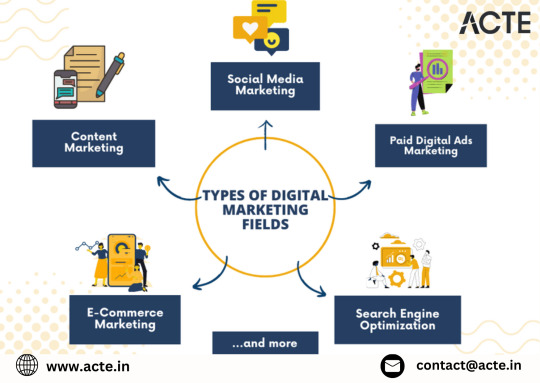
4. Data Analytics and Marketing Automation: Empowering Informed Decision-Making
Data-driven decision-making is increasingly prevalent in digital marketing, with businesses leveraging analytics to optimize their strategies. Professionals proficient in data analysis, marketing automation, and CRM systems are indispensable in helping businesses derive actionable insights. By harnessing data effectively, marketers can enhance campaign performance, refine targeting, and drive superior results.
5. E-commerce Optimization: Seizing Opportunities in Online Retail
The e-commerce sector has witnessed explosive growth, especially accelerated by recent global events. With consumers increasingly turning to online shopping, businesses are prioritizing e-commerce optimization to enhance the shopping experience and drive conversions. Digital marketers specializing in e-commerce optimization, CRO, and UX design stand to capitalize on this thriving market.
6. Mobile Marketing: Harnessing the Power of Mobile Devices
The proliferation of smartphones and mobile devices has opened significant opportunities for marketers to connect with consumers on-the-go. Mobile-focused strategies such as app marketing, SMS campaigns, and location-based marketing are gaining traction. Professionals specializing in mobile marketing tactics and understanding the nuances of the mobile landscape are poised to thrive in this dynamic field.
Conclusion: Embracing the Future of Digital Marketing
As the digital marketing landscape continues to evolve, professionals must remain adaptable and continually upskill to stay competitive. By identifying promising areas for future growth and specializing in relevant fields, digital marketers can position themselves for long-term success. Whether through content creation, data analytics, or emerging trends like mobile marketing, the potential for advancement in digital marketing is vast. With dedication and expertise, aspiring professionals can navigate the future of the industry with confidence and seize the opportunities that lie ahead.
#tech#training#digital marketing company#digital marketing#digital marketing course#email marketing#online marketing#search engine optimization#seo#seo services
2 notes
·
View notes
Text
A while back, I remember asking someone what their ideal role would be, and their answer took me by surprise. They said they wanted to be in a role where they could be a complete beginner — that ideally, people’s expectations of them would be similar to a new grad’s, and they could ask any and all questions they had, no matter how basic. The more senior in a career you get, the more stories people make up around “I should know this already” or “What will people think if I ask them for help?” The explicit expectation that you don’t know anything at all can be appealing.
But we don’t need to go so far in that direction, either. Something I have to constantly remind myself of is that the skills and experiences we pick up (whether through explicit upskilling or just gathered through the living of life and the working of work) serve us in ways we couldn’t even imagine, and sometimes in ways we don’t even know. The 3+ years I spent in leadership development and coaching aren’t time that took away from my career as an engineering leader. Those years enhance my experience, uniquely making me the engineering leader I am now.
Back when I was an individual contributor, I was grappling with the evergreen question of should I stay a generalist or specialize in something? Technical breadth or technical depth? It felt like if I chose something to specialize in, I would be choosing something to build the next few decades of my career around, and that felt overwhelming, daunting, impossible. One of the best pieces of advice I received was that even as a generalist, you want to build depth, and that building depth in one area just exercises the muscle of building depth in other areas. Although technical areas of expertise may feel very different, the set of skills you use to build depth in one area help you build depth elsewhere. Like linguists who pick up each subsequent language ever more quickly than the last.
Similarly, moving “back” into an IC role doesn’t mean that you’ve taken a decade leap backwards in your career. You are coming to that IC role with all the experiences and knowledge you gained as a manager — your understanding of stakeholder management, of business needs, of how to communicate with managers. Even if you feel a bit rusty with your technical skills, you bring your own unique version of being an IC to your role, that no one else could.
Jean Hsiu
3 notes
·
View notes
Note
How to survive having a job that you don't like? (Sadly. It's not the vibe. But quitting is not an option)
Hi love! I empathize with you on this one. Spending your entire day and mental energy on tasks you dread doing (and need to execute well) can be overwhelmingly draining. I'm hoping that this job only takes up 5 days of your week! Here are my best tips:
Keep Your "Why" Top of Mind: Even if a job doesn't align with your interests and passions or is in a bad working environment, you have to focus on the short-term purpose the job provides. Relish in having a steady paycheck to give you food to eat and a roof over your head. While long-term you deserve to find more purpose in your work, having a semblance of financial security will always top having to constantly worry about where your next meal is coming from – even if you hate every moment of being on the clock.
Plan Ahead: Mentally work through the following day ahead of time. Plan the tasks, meetings, and logistics right when you're ending your work day. This framework allows you to overcome the mental blocks and dread before you can go into decompress mode, so you can just wake up and go through the motions the next day. Taking the emotional aspect out of the daily work you hate is the simplest way to avoid burnout (at least in the short term).
Systemize Your Days (When Possible): Creating systems for different tasks or even your entire day can help you be more productive and lighten your mental load. This practice can help you to get your dreaded work done in less time while allowing you to feel less drained at the end of your shift. It's a win-win strategy. Create email templates you save for different types of messages (client-facing, different types of projects, scheduling meetings, presentation notes, etc.), have a folder organizing your different projects, program different Excel formats, and have outlines of decks saved – almost like a pre-made template that's actually useful (and potentially unique).
Focus On Skill Building Over Purpose: Consider the transferable skills you're acquiring while enduring this position – even if they don't pertain to your desired industry or role. Some of these universally-helpful transferable skills include writing a killer email, building a convincing case or admirable deck, learning how to speak to clients or stakeholders with confidence and grace, team-building and collaboration, organization, interpersonal communication, or simply prolonging your attention span. Reflect and dive deep to consider all the life lessons you can leverage later on by holding down this occupation.
Find Ways To Network Outside of Work Hours: Follow & connect with colleagues and influential figures in your industry on social media. Thoughtfully engage with the content they share. Ask about treating them to coffee for an informational interview. Go out to industry-related events, conferences, etc., and make sure to connect with those you met on LinkedIn the next day with a personalized connection message. Connect two of your mutual connections whenever possible. Allow karma to work in your favor.
Lurk, Research, & Study To Optimize Your Job Search: Set aside 20-30 minutes a day to search LinkedIn, job boards, social media (Twitter, Instagram), etc. to see potential next opportunities and evaluate the current market, trends, and most in-demand skillsets within your field/industry. Always tailor your applications and messages to mutual connections or hiring managers when applying to new roles. Be aware of your desired role/industry is evolving. Upskill whenever possible to increase your market value.
Incorporate Simple Pleasures Into Your Days: Make your favorite coffee every morning, have a go-to playlist that improves your mood to listen to before work, incorporate your favorite healthy meals into your week, find a workout you enjoy to add into your day either before or after work, indulge in a favorite book or TV show after work as a "reward" for making it through the day. Practice self-care – do a face mask or specialty hair treatment on a weeknight. Invest in an at-home massage tool or luxurious loungewear to wear in the evenings.
Indulge In A Creative Outlet: Find an opportunity for growth and self-expression outside of a workplace setting. Write, read, paint, draw, cook, bake, take a dance class, learn a new language, how to play a new instrument, or about interior design. Create Pinterest boards, poems, new playlists, and new recipes to celebrate your desire for variety in your otherwise mundane life.
Have Plans To Look Forward To Every Week: Whether it's hanging out with friends, going to a museum, watching a movie, or taking a walk along your favorite local route. Ensure you enjoy how you spend your days off. Don't waste time worrying about a dead-end job when you're off the clock. Spending your leisure time on your own terms. Take this time to do what you love.
Romanticize The Lifestyle It Provides: When motivation or your morale hits a low point, take time for gratitude and focus on the resources this job allows you to integrate into your life – whether that's a roof over your head, the opportunity to eat meals you enjoy, wear outfits you love, or even just provide you some sort of daily routine.
Consider your current job as a chapter in your life and career. Acquire the lessons, skills, relationships, and resources you can as preparation for the next stage in your ever-evolving journey.
Hope this helps xx
#career advice#career path#self care#femmefatale#dark feminine energy#dark femininity#high value woman#higher self#career tips#life advice#high value mindset#it girl#female excellence#dream girl#loa success#success mindset#personal growth#female power#girl advice#jobsearch#life skills#social skills#skilldevelopment#interpersonal relationships#networking#femmefatalevibe
104 notes
·
View notes
Text

In today's dynamic business landscape, the synergy of emerging technologies and advancements in automation and robotics has created a promising environment for growth and innovation. However, businesses face significant challenges such as the global labor shortage and a widening skills gap, hindering the full realization of potential growth. These obstacles highlight the importance of workforce planning and strategic talent acquisition to ensure companies have the necessary skill sets for the successful implementation of new technologies.
Recognizing the need for a skilled workforce, many organizations are turning to HR solutions companies like SilverPeople to navigate these challenges. Partnering with such firms can offer invaluable support in building a workforce for the future. Strategic workforce planning becomes essential when addressing issues like fluctuating customer demands, disruptions in the supply chain, and the ongoing labor shortage. It enables organizations to:
Reduce Labor Costs: Efficient workforce planning helps in optimizing labor costs by ensuring that talent is deployed where it generates the most value for the business.
Optimal Talent Deployment: Ensures that available talent is utilized effectively, preventing overwork and supporting staff satisfaction and retention.
Identify Skills Gaps: Enables organizations to identify current and future skills gaps, providing insights for upskilling, reskilling, and professional development initiatives.
HR solutions companies like SilverPeople provide the resources and technology necessary for effective workforce planning. They offer insights into worker expectations, helping employers create robust recruitment strategies and competitive compensation packages to attract top talent.
Flexible staffing, particularly the use of contingent workers, has gained prominence globally. A Deloitte study revealed that larger companies are allocating up to 30% of their procurement spend on contingent workers. Strategic deployment of flexible workers can lead to cost savings, acquisition of specific skills for short-term needs, and increased workforce agility. While beneficial, managing a flexible workforce can be challenging, making the expertise of an HR solutions partner crucial for effective workforce planning.
Redeployment and career development within existing organizations are essential components of workforce planning, especially as the skills gap widens. Career development programs not only improve workforce engagement and productivity but also address concerns about job security. By creating transparent processes and empowering employees to manage their own careers, organizations can foster a positive work environment and secure the skills needed for the future.
The necessity of optimizing time and money in business operations, particularly in HR functions like recruitment, is paramount. Working with an HR solutions partner streamlines the recruitment process, leveraging their expertise to identify efficiencies and stay updated on cutting-edge trends and technologies. For instance, the use of chatbots can significantly reduce the cost-per-hire compared to traditional methods.
For small businesses operating on tight budgets, the prospect of navigating the labor market and making the right hires can be daunting. The U.S. Department of Labor estimates that the cost of a bad hire can be as high as 30% of the new hire’s annual salary. Outsourcing hiring to an experienced recruitment company like SilverPeople becomes a strategic move, providing businesses with confidence in acquiring the right talent and avoiding costly mistakes.
In an era where talent shortages threaten business growth, sourcing hard-to-find talent becomes a critical challenge. A recruitment company with a vast and diverse talent network, such as SilverPeople, equips businesses with the ability to quickly find the right people. Their insights into emerging trends and in-demand skills, such as artificial intelligence, machine learning, and cybersecurity, help organizations prepare for the future.
As businesses strive for success in 2023 and beyond, partnering with an HR solutions company emerges as a crucial strategy. These partnerships not only address immediate talent needs but also facilitate long-term workforce planning, ensuring organizations are well-equipped to navigate the challenges of a rapidly evolving business landscape.
SilverPeople specializes and is placed strongly in 7 Industry verticals: Retail, E-Commerce, Education, Real estate, Fintech, Digital Transformation and Sustainability. SilverPeople has a deep understanding & strong capability to solve Digital Transformation Hiring challenges and is the go-to place for ‘Go Digital’ recruitment consulting!
Connect with us -
Website: www.silverpeople.in
Email id: [email protected]
Contact no: +91–9620439053
2 notes
·
View notes
Text

Best e-learning platform in India
Garage Productions offers the best e-learning platform in India with engaging courses and training programs. As a leading production company, our interactive digital learning solutions help professionals, students and organizations build skills and achieve goals. The customized LMS and content cater to diverse needs. Experience convenient, effective learning through videos, assessments and discussion forums. Upskill comfortably from home on India's premier e-learning platform.
2 notes
·
View notes
Text
Navigating the Changing Landscape: Key Trends for Today's Job Seekers
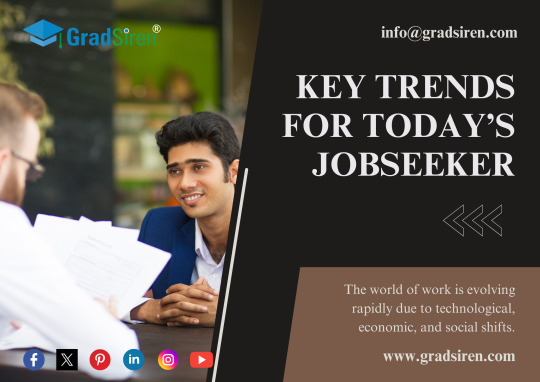
The world of work is evolving rapidly due to technological, economic, and social shifts. For job seekers, this means new career opportunities but also new challenges. Tracking and understanding the latest trends is essential for job seekers to navigate the employment landscape effectively.
Recognizing these trends also allows employers to align their hiring practices with what today's candidates value most. This article will break down key developments shaping the experiences of job seekers in the modern era.
The Importance of Tracking Job Seeker Trends
Job seeker behaviors and priorities are not static. As the workforce and workplace culture changes over time, so do attitudes toward work. Ongoing trends reflect transformations in how people search for jobs, where they focus efforts, and what they expect from potential employers.
For job seekers, recognizing these trends allows tailoring of resumes, skills development, and more to align with employer priorities. When individuals showcase relevant skills and experiences sought by companies today, their candidacy becomes more competitive.
Key Job Seeker Trends to Follow
Technological Advancements Changing the Job Search Process
Online job boards like GradSiren increase accessible career opportunities for freshers and experienced candidates. Customized profiles allow matching with suitable roles.
Job seekers use job sites not just for listings but also for networking, company research, content sharing, and building an online professional brand.
AI plays an increasing role through resume screening, automated video interviews, and candidate evaluation algorithms. This provides efficiency but requires balancing human interaction.
Growing Popularity of Remote and Hybrid Work Models
Surveys consistently show over 75% of workers now want remote or hybrid work options. Many became accustomed to location flexibility during the pandemic.
Fully remote roles offer total flexibility. Hybrid arrangements blend on-site and remote work to balance benefits.
Companies insisting on fully in-office roles may struggle to attract applicants who desire flexibility.
Prioritizing Diversity, Equity, and Inclusion
Today's job seekers closely evaluate a company's diversity, equity and inclusion efforts when considering roles. They prefer employers who demonstrate real action on raising DEI.
Offering benefits supporting marginalized groups, transparent diversity statistics, anti-bias training, and review of inequities signals commitment to progress.
Companies lagging on DEI initiatives will have a much smaller talent pool to recruit from amid increasing candidate scrutiny.
Growth of the Freelance "Gig Economy"
Over 35% of the U.S. workforce now participates in freelance "gig economy" roles, with projections of continued increase. The flexibility to choose one's projects and hours has great appeal.
Freelancing is a temporary income source while individuals search for traditional full-time employment.
However, gig roles often confer fewer employee benefits and protections. Unpredictable income also poses challenges for workers.
Emphasizing Continuous Skills Development
Today's candidates understand the need to continually gain new skills rather than remain static in one job long-term. Employers facilitating ongoing career development are most attractive.
Workers independently take online courses, earn certifications, and build capabilities not just to change jobs but also to progress within roles.
Companies providing upskilling support and defined paths for internal mobility have a competitive edge in recruiting.
Factors Influencing Changes in Job Seeker Attitudes
Economic Growth Cycles: In strong economies with low unemployment, applicants have more leverage and higher demands. Recessions reverse this dynamic.
Generational Differences: Younger Millennial and Gen Z job seekers have expectations shaped by the technological era they grew up in. Priorities differ from older generations.
Technological Disruption: Developments like AI recruiting tools, virtual reality practice interviews, wearables tracking applicant biometrics, and more will transform jobs seeker experiences.
Cultural Shifts in Attitudes About Work: Discussions around mental health, work-life balance, and flexibility lead employees to expect employers to provide a healthy work culture supporting well-being.
Persistent Challenges Facing Job Seekers Today
Intensely Competitive Job Market: The oversaturation of qualified applicants means intense competition for available openings. This job seeker struggle has intensified coming out of the pandemic.
Skills Mismatch Between Employers and Applicants: Employers frequently request qualifications exceeding what roles require. Meanwhile, applicants cannot develop skills fast enough to keep pace with demands.
Mental Health Impacts: The strain and uncertainty of job-seeking take a psychological toll. Financial duress and rejection worsen mental health issues. But taking time to recover risks being left behind.
Continued Discrimination and Bias: Despite diversity initiatives, marginalized groups still face substantial barriers to equal opportunities. Achieving systemic change remains gradual.
Looking Ahead: The Future Job Seeker Landscape
As cultural acceptance grows, insisting on fully on-site roles will severely limit applicant pools. Hybrid arrangements will likely become the norm, appealing to work-life balance priorities.
While momentum on DEI is building, much work remains to create equitable access to opportunities. This will continue gaining focus from socially conscious job seekers.
Developments in VR recruiting, expanded AI capabilities, biometrics tracking, and more will transform how job seekers interact with employers. Ensuring ethics around data use will be crucial.
As automation changes workplace skill demands, job seekers will need continuous learning opportunities throughout their careers. Companies investing in upskilling will lead the way.
Reduced stigma and increasing workplace burnout will compel employers to prioritize emotional well-being through new policies. A healthy work-life balance will attract top talent.
Conclusion
Tracking emerging trends among job seekers provides crucial insights into the evolving employment landscape. Both individuals looking for work and companies hoping to attract talent must recognize these developments and shifting expectations. Also, modern job boards like GradSiren are essential for today's job seekers. Their customizable searches and alerts notify you of new openings matching your qualifications and keywords so you can instantly find and apply for relevant opportunities.
2 notes
·
View notes
Text
Navigating the Changing Landscape: Key Trends for Today's Job Seekers
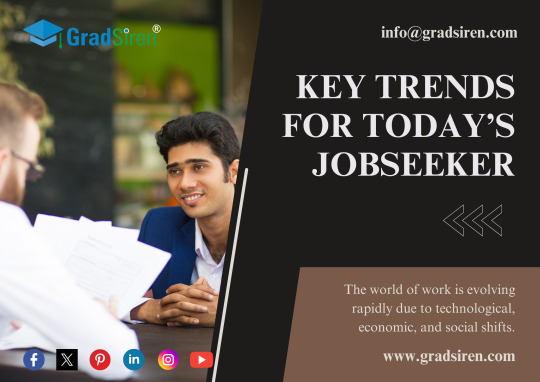
The world of work is evolving rapidly due to technological, economic, and social shifts. For job seekers, this means new career opportunities but also new challenges. Tracking and understanding the latest trends is essential for job seekers to navigate the employment landscape effectively.
Recognizing these trends also allows employers to align their hiring practices with what today's candidates value most. This article will break down key developments shaping the experiences of job seekers in the modern era.
The Importance of Tracking Job Seeker Trends
Job seeker behaviors and priorities are not static. As the workforce and workplace culture changes over time, so do attitudes toward work. Ongoing trends reflect transformations in how people search for jobs, where they focus efforts, and what they expect from potential employers.
For job seekers, recognizing these trends allows tailoring of resumes, skills development, and more to align with employer priorities. When individuals showcase relevant skills and experiences sought by companies today, their candidacy becomes more competitive.
Key Job Seeker Trends to Follow
Technological Advancements Changing the Job Search Process
Online job boards like GradSiren increase accessible career opportunities for freshers and experienced candidates. Customized profiles allow matching with suitable roles.
Job seekers use job sites not just for listings but also for networking, company research, content sharing, and building an online professional brand.
AI plays an increasing role through resume screening, automated video interviews, and candidate evaluation algorithms. This provides efficiency but requires balancing human interaction.
Growing Popularity of Remote and Hybrid Work Models
Surveys consistently show over 75% of workers now want remote or hybrid work options. Many became accustomed to location flexibility during the pandemic.
Fully remote roles offer total flexibility. Hybrid arrangements blend on-site and remote work to balance benefits.
Companies insisting on fully in-office roles may struggle to attract applicants who desire flexibility.
Prioritizing Diversity, Equity, and Inclusion
Today's job seekers closely evaluate a company's diversity, equity and inclusion efforts when considering roles. They prefer employers who demonstrate real action on raising DEI.
Offering benefits supporting marginalized groups, transparent diversity statistics, anti-bias training, and review of inequities signals commitment to progress.
Companies lagging on DEI initiatives will have a much smaller talent pool to recruit from amid increasing candidate scrutiny.
Growth of the Freelance "Gig Economy"
Over 35% of the U.S. workforce now participates in freelance "gig economy" roles, with projections of continued increase. The flexibility to choose one's projects and hours has great appeal.
Freelancing is a temporary income source while individuals search for traditional full-time employment.
However, gig roles often confer fewer employee benefits and protections. Unpredictable income also poses challenges for workers.
Emphasizing Continuous Skills Development
Today's candidates understand the need to continually gain new skills rather than remain static in one job long-term. Employers facilitating ongoing career development are most attractive.
Workers independently take online courses, earn certifications, and build capabilities not just to change jobs but also to progress within roles.
Companies providing upskilling support and defined paths for internal mobility have a competitive edge in recruiting.
Factors Influencing Changes in Job Seeker Attitudes
Economic Growth Cycles: In strong economies with low unemployment, applicants have more leverage and higher demands. Recessions reverse this dynamic.
Generational Differences: Younger Millennial and Gen Z job seekers have expectations shaped by the technological era they grew up in. Priorities differ from older generations.
Technological Disruption: Developments like AI recruiting tools, virtual reality practice interviews, wearables tracking applicant biometrics, and more will transform jobs seeker experiences.
Cultural Shifts in Attitudes About Work: Discussions around mental health, work-life balance, and flexibility lead employees to expect employers to provide a healthy work culture supporting well-being.
Persistent Challenges Facing Job Seekers Today
Intensely Competitive Job Market: The oversaturation of qualified applicants means intense competition for available openings. This job seeker struggle has intensified coming out of the pandemic.
Skills Mismatch Between Employers and Applicants: Employers frequently request qualifications exceeding what roles require. Meanwhile, applicants cannot develop skills fast enough to keep pace with demands.
Mental Health Impacts: The strain and uncertainty of job-seeking take a psychological toll. Financial duress and rejection worsen mental health issues. But taking time to recover risks being left behind.
Continued Discrimination and Bias: Despite diversity initiatives, marginalized groups still face substantial barriers to equal opportunities. Achieving systemic change remains gradual.
Looking Ahead: The Future Job Seeker Landscape
As cultural acceptance grows, insisting on fully on-site roles will severely limit applicant pools. Hybrid arrangements will likely become the norm, appealing to work-life balance priorities.
While momentum on DEI is building, much work remains to create equitable access to opportunities. This will continue gaining focus from socially conscious job seekers.
Developments in VR recruiting, expanded AI capabilities, biometrics tracking, and more will transform how job seekers interact with employers. Ensuring ethics around data use will be crucial.
As automation changes workplace skill demands, job seekers will need continuous learning opportunities throughout their careers. Companies investing in upskilling will lead the way.
Reduced stigma and increasing workplace burnout will compel employers to prioritize emotional well-being through new policies. A healthy work-life balance will attract top talent.
Conclusion
Tracking emerging trends among job seekers provides crucial insights into the evolving employment landscape. Both individuals looking for work and companies hoping to attract talent must recognize these developments and shifting expectations. Also, modern job boards like GradSiren are essential for today's job seekers. Their customizable searches and alerts notify you of new openings matching your qualifications and keywords so you can instantly find and apply for relevant opportunities.
2 notes
·
View notes